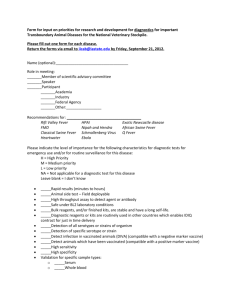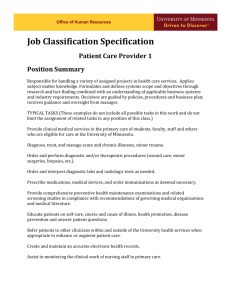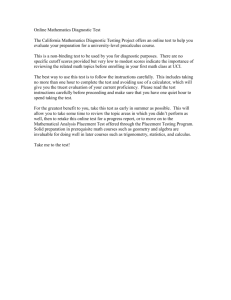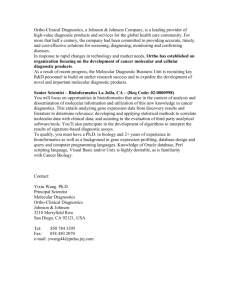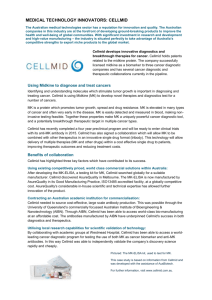Department of Clinical Laboratory Diagnostics
advertisement
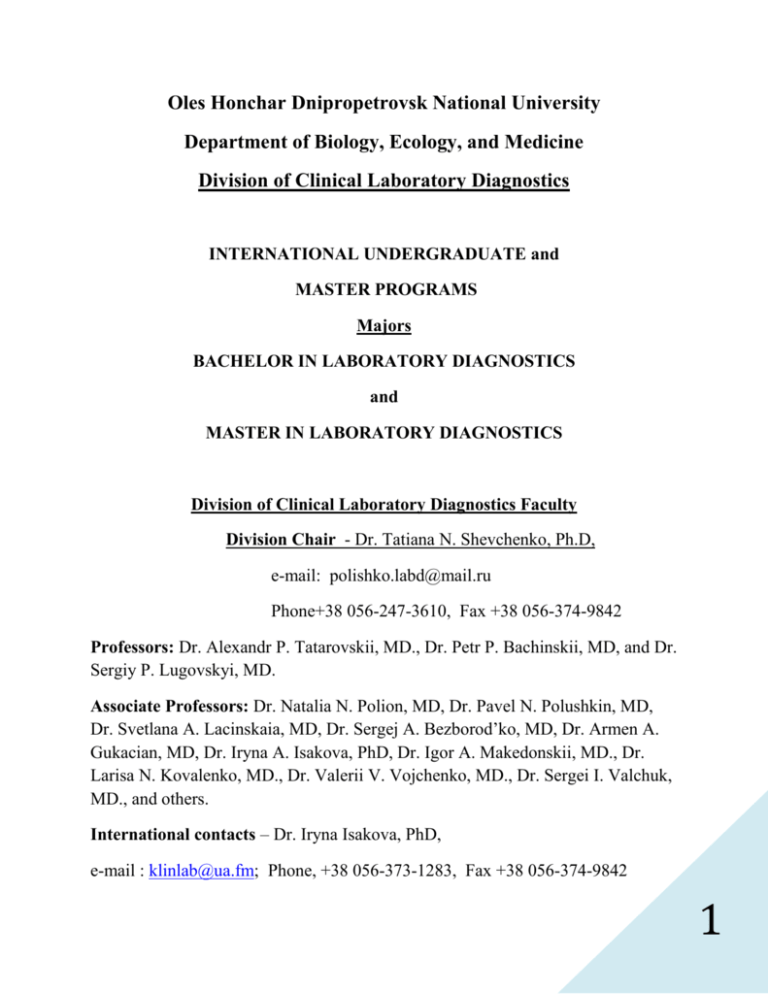
Oles Honchar Dnipropetrovsk National University Department of Biology, Ecology, and Medicine Division of Clinical Laboratory Diagnostics INTERNATIONAL UNDERGRADUATE and MASTER PROGRAMS Majors BACHELOR IN LABORATORY DIAGNOSTICS and MASTER IN LABORATORY DIAGNOSTICS Division of Clinical Laboratory Diagnostics Faculty Division Chair - Dr. Tatiana N. Shevchenko, Ph.D, e-mail: polishko.labd@mail.ru Phone+38 056-247-3610, Fax +38 056-374-9842 Professors: Dr. Alexandr P. Tatarovskii, MD., Dr. Petr P. Bachinskii, MD, and Dr. Sergiy P. Lugovskyi, MD. Associate Professors: Dr. Natalia N. Polion, MD, Dr. Pavel N. Polushkin, MD, Dr. Svetlana A. Lacinskaia, MD, Dr. Sergej A. Bezborod’ko, MD, Dr. Armen A. Gukacian, MD, Dr. Iryna A. Isakova, PhD, Dr. Igor A. Makedonskii, MD., Dr. Larisa N. Kovalenko, MD., Dr. Valerii V. Vojchenko, MD., Dr. Sergei I. Valchuk, MD., and others. International contacts – Dr. Iryna Isakova, PhD, e-mail : klinlab@ua.fm; Phone, +38 056-373-1283, Fax +38 056-374-9842 1 Students are encouraged to choose courses from the list below for a total of 60 credits a year. The appropriate prerequisites must be completed for the advanced courses. BACHELOR PROGRAM COURSES № Course Title 1 Human Anatomy 2 Medical Biology 3 Social Medicine 4 Histology, Cytology, Embryology 5 Radiation Medicine 6 Laboratory Diagnostics 7 Biochemistry Brief Description This course offers a detailed overview of the human body anatomical structure with respect to a complex interaction between tissues, organs, and organ systems in the body. This course includes a wide range of topics from the organization of the living systems to fundamentals of cell biology, genetics, ecology and parasitology. Students will study development of the most common inherited disorders and infectious diseases, as well as applicable preventive measures. This discipline addresses public health issues through evaluation of an impact of social and economic conditions on public health. Such understanding can be used to improve people’s health and optimized the health care system. Statistical methods of public health assessment are discussed. This discipline includes a broad spectrum of advanced cytology and histology fundamentals from an ultrastructure and basic features of mammal tissues to interactions between different tissues and organs in the developing human body. This course addresses biological effects of radiation exposure on the human body at all levels from cellular to the organs and a whole organism to the human populations. This course provides a thorough introduction to the diagnostic strategy used at the clinical laboratory and an overview of the modern most common functional and laboratory clinical diagnostic methods. This course describes in details the structure and functions of nucleic acids, proteins, and other organic molecules in the living cell as well as the most essential biochemical reactions in the human body. Prerequisite courses Credits (ECTS ) 6.0 4.0 2.5 Biology 4.5 5.5 1.5 Inorganic Chemistry, Organic Chemistry 4.5 2 8 Laboratory Techniques 9 Medical Laboratory Techniques 10 Functional Diagnostics 11 Pathoanatomy 12 Pathophysiology 13 Propaedeutics of Pediatrics with Patient Care 14 Propaedeutics of Internal Organs Diseases with Patient Care Basic Pharmacology 15 16 Epidemiology of Infectious This discipline addresses the specifics of working at the clinical diagnostic laboratory such as modern diagnostic tests requirements, laboratory equipment and reagents, and also professional skills and qualities needed to perform the diagnostic analysis. This course offers a detailed overview of the most common types of tests used in the modern clinical diagnostic laboratories and discusses feasibility criteria used in the field of clinical diagnostics. This course provides a thorough introduction to the functional diagnostic tests and methods. It describes the most common modern functional diagnostic medical systems and the methodology of the data analysis in pulmonary, cardiac, and Vscan function tests. This discipline is focused on etiology and pathogenesis of organic diseases with the emphasis on the detectable “blueprint” of the illnesses in the human body. This course offers a detailed overview of etiology, pathogenesis, clinical symptoms, and preventive measures of different pathological conditions, including blood and hormonal disorders, visceral diseases, etc. This course provides a thorough introduction to the methodology of pediatric diagnostics. Symptoms of the mostly common pediatric diseases will be discussed along with appropriate diagnostic tests and interpretation of the results. Techniques of the pediatric patients care will be also discussed. This course provides a thorough introduction to the specifics of internal organs diseases such as etiology, symptoms of the diseases and the diagnostic methodology. Techniques of the patients care also will be discussed. This course is focused mainly on the characteristics of the most common modern drugs and mechanisms of the drugs interaction in the body. Most common causes of drugs side effects and clinical diagnostic tests for such conditions will be also discussed. This course provides a detailed description of the most common infectious diseases including 9.0 2.5 Human Anatomy 5.5 Human Anatomy 2.5 Human Anatomy 3 Human Anatomy 2.5 Human Anatomy 2.5 Biochemistry 3.0 Medical Biology 2.5 3 Diseases 17 Laboratory Diagnostics of Infectious Diseases 18 Dermatologic and Sexually Transmitted Diseases 19 Diagnostics of Sexually Transmitted Diseases 20 Emergency Medicine. 21 Prenatal Diagnostics 22 Laboratory Immunology 23 Inherited Diseases 24 DNA-based Diagnostics epidemiology, clinical symptoms and pathogenesis of the diseases as well as a brief overview of the appropriate clinical diagnostic tests. This discipline is focused on clinical laboratory tests for a variety of common infectious diseases as well as characteristics of the widespread bacterial and viral pathogens with respect to the clinical diagnostics. This course is focused on etiology, typical clinical symptoms, and preventive measures of the most common dermatologic and sexually transmitted diseases (STD) like Chlamydiosis, Syphilis, Trichomoniasis, etc. This discipline based on the basic knowledge offered by the Dermatologic and STD course describes modern diagnostic methods of the most common STD such as HIV, Chlamydiosis, Syphilis, Trichomoniasis, etc. The course addresses fundamentals of the emergency medicine including diagnostics of acute illnesses and injuries along with specifics of taking care of patients who require immediate medical assistance. This discipline is focused on female physiology, pathophysiology, obstetrics, and prenatal diagnostic approaches including markers of the most common obstetric and gynecological diseases. This course offers a detailed description of the most common diagnostic methods based on the antigen-antibody interaction such as immunochemistry, immunohistochemistsry, a number of direct and indirect ELISA tests. This discipline provides a thorough overview of genetic and chromosomal inherited diseases with the emphasis on etiology and clinical symptoms of the disorders. The difference between inherited diseases and congenital disorders will be explained. The diagnostic strategy for the inherited pathological conditions will be briefly reviewed. This course offers a detailed description of the most common DNA-based clinical diagnostic methods and tools including RFLP, different types of PCR, and microchip technology. Epidemiology of Infectious Diseases 1.5 Histology, Cytology, Embryology 1.5 Dermatologic al and sexually transmitted diseases Human Anatomy 5.0 Human Anatomy, Pathophysiolo gy 5.5 Medical Biology, Chemistry. 5.5 Medical Biology 2.5 Medical Biology, 5 1.0 4 MASTER PROGRAM COURSES Course № Title 1 Management and Marketing in Health Care 2 Medical Statistics 3 Bioethics and Biosafety 4 Clinical Pharmacology 5 Clinical Diagnostics Quality Control 1&2 Prescription Drug Monitoring 1&2 6 7 Forensic Medicine 8 Evidencebased Medicine (EBM) Brief Description Different aspects of the health care systems are viewed in the light of modern business management, in particular, regarding cost and consumer effectiveness. Latest advances and typical problems in the health care system will be discussed. This course offers applications of statistics to the medicine and the health sciences, including epidemiology, public health, forensic medicine, and clinical research. This discipline addresses public health and public safety issues related to professional qualities and skills of managers, researchers, and staff working at the modern clinical diagnostic laboratories. Based on the Basic Pharmacology course, this discipline provides a deeper knowledge of the drugs interaction in the human body, specifics of drug prescription, and the most common types of side effects of prescription and overthe-counter medications. This course offers an extended overview of advanced approaches to the diagnostic tests data analysis, including the results interpretation and statistical validation methods. This discipline addresses a number of public health and public safety issues related to the safety and feasibility of the drug prescription approaches. Human drug metabolism is also discussed. Modern forensic medicine is characterized mainly as forensic pathology research field that involves collection and analysis of biological samples to produce objective information for use in the legal system. Basic forensic methods will be discussed. This discipline addresses specifics of obtaining evidence of risks and benefits of medical treatments (including lack of treatment) and diagnostic tests. Evidence quality can be assessed based on the source type including statistical validity, clinical relevance,etc. Prerequisite courses Social Medicine Credits (ECTS) 3.0 Medical Laboratory Techniques 1.5 Social Medicine 1.5 Basic 1.5 Pharmacology Laboratory techniques 5.0 Basic 3.0 Pharmacology Biochemistry, Histology, Cytology, Embryology 2.5 Medical laboratory techniques 3.0 5 9 Diseases of Civilization 10 Scientific Method of Research 11 Clinical Pathohistology 12 Clinical Genetics 13 Pathobiochemistry 14 Management of Laboratory Diagnostics 1 15 Management of Laboratory Diagnostics 2 16 Management of Laboratory Diagnostics 3 17 Clinical Immunology and Allergology 18 Cytological Diagnostics 19 Diagnostics of Sexually Transmitted Diseases This course discusses effects of globalization on the world disease pattern. Infectious and noncommunicable diseases will be reviewed.. This course addresses a number of methodological approaches appropriate for the clinical diagnostic tests as well as the data analysis and statistical validation. This discipline offers an extended overview of etiology, pathogenesis, clinical symptoms, and preventive measures of a wide range of illnesses and diseases, including blood and hormonal disorders, and visceral diseases. Clinical genetics will be discussed as a complex system of scientific, diagnostic, therapeutic, and preventive approaches and measures with respect to the public health. The diagnostic tests for genetic diseases as well as genetic counseling will be explained. A wide spectrum of cellular biochemical processes in the healthy human body is reviewed and distinguished from biochemical pathological modifications in the diseased organism. Diagnostic approaches are discussed. Management of the diagnostic tests quality and the ways to improve the efficacy and accuracy of the diagnostic tools will be discussed. Evaluation of the clinical diagnostic tests will be discussed in details including statistical analysis and validity of the tests data. Specifics of the biochemical processes identifying pathological conditions in the human body will be reviewed. This course offers a detailed characteristics of the human immune system, specifics of its functions and different aspects of the most common human immune disorders, including allergies. This discipline is focused on cytological techniques applicable for examination of different biological samples: conventional and fine-needle aspiration biopsies (so called rapid on-site evaluation method or ROSE). This discipline describes modern diagnostic methods of the most common sexually transmitted diseases such as HIV, Chlamydiosis, Syphilis, Trichomoniasis, etc. Epidemiology of Infectious Diseases Medical Laboratory Techniques 2.5 Histology, Cytology, Embryology 3.0 Medical Biology 4.0 Biochemistry 3.0 Laboratory Diagnostics 3.0 Medical laboratory techniques Biochemistry 1.0 Biochemistry 4.0 Histology, cytology, embryology 5.0 Dermatologic and sexually transmitted diseases 5.0 1.5 1.0 6 20 Prenatal Diagnostics This discipline is focused on female physiology, pathophysiology, obstetrics, and prenatal diagnostic approaches. Pathophysiolo gy 5.5 7
